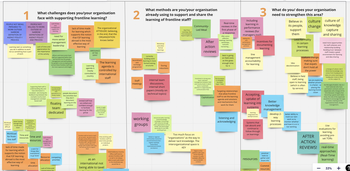In December 2022, ALNAP hosted a webinar to launch our new practical resources and our report on frontline learning. As well as sharing the tacit and action learning resource packs, we hoped to start a discussion about supporting the generation, sharing and valuing of the knowledge of frontline staff within the sector. I had the pleasure of chairing the discussion – many thanks to Sali Hafez, Md. Mujibul Haque Munir and Amélie Cardon for taking part – and exploring the interesting insights added by webinar participants throughout the session.
During the webinar we put three questions to the participants and asked them to add their responses to a Miro board – as you can see the participants did not disappoint! The board was very busy with people adding their reflections and I’ve since had the opportunity to synthesise those responses into some key takeaways from each of the questions.
"Most participants advocated for culture change to support and strengthen their approach to frontline learning."

Most participants advocated for culture change to support and strengthen their approach to frontline learning. Key suggestions were to encourage a culture of capturing and sharing learning, building relationships and trust between colleagues, and believing more in the capacities of frontline staff. While time and resources were the most cited challenge, only a couple of people raised these as solutions, which might reflect a growing sense that more time and money is an optimistic ask in a system increasingly under pressure from complex and protracted disasters with a stretched resource base.
Another important focus was on decolonising the learning agenda by recognising that knowledge doesn’t just come from headquarters but exists locally. Some practical process suggestions were to shift learning functions closer to the level of implementation and to create incentives to prioritise learning among staff by incorporating it into performance management frameworks. Finally, a set of suggestions focused on adopting or altering MEAL processes to include opportunities for real-time learning and more regular reflection.
By far the most common challenge faced by respondents and their organisations was the lack of time and resources for frontline staff to participate in learning and for other staff members with competing priorities to engage with their frontline colleagues.
The next most frequently cited barriers were around organisational cultures that were not supportive of learning, either in general or of frontline learning more specifically. This included concerns that management was not prioritising learning and that unequal power dynamics between national and international staff caused blockages.
Some participants claimed that international staff controlled the learning agenda, which is a particular obstacle when coupled with lack of access by international staff to those working directly in communities. Indeed, one webinar participant highlighted the ‘arrogance of the expat’ as a key challenge to change.
Other concerns related to not having the correct systems in place to share learning in a manner that would allow its timely incorporation into programme implementation. A smaller group flagged staff lacking the skills or confidence to identify important knowledge or to facilitate learning among colleagues.
Another important focus was on decolonising the learning agenda by recognising that knowledge doesn’t just come from headquarters but exists locally.
Above and beyond the questions about challenges, it was great to see some clear examples of what individuals and organisations are already doing to support these processes.
The majority of these were of organisations altering their MEAL plans to include more real-time aspects, after action reviews or community-led processes. Several individuals and organisations are already participating in working groups and communities of practice for either virtual or in-person sharing of learning, while others are focusing on staff exchanges and more project visits to encourage experiential learning.
Some were also focusing on improving systems for knowledge management and communication between different layers of the organisation. Finally, several inputs focused on the need to look beyond individual organisations by considering sector level efforts like Kaya or ALNAP (thanks for the mention!) to facilitate the sharing of learning between organisations.
More detail is in the Miro board, so do feel free to zoom in and take a look! We hope the webinar was useful for participants as an initial exploration of some of these issues and a way for us to share findings from our recent work on frontline learning. We look forward to continuing this discussion and hearing how people are taking some of these ideas forward.